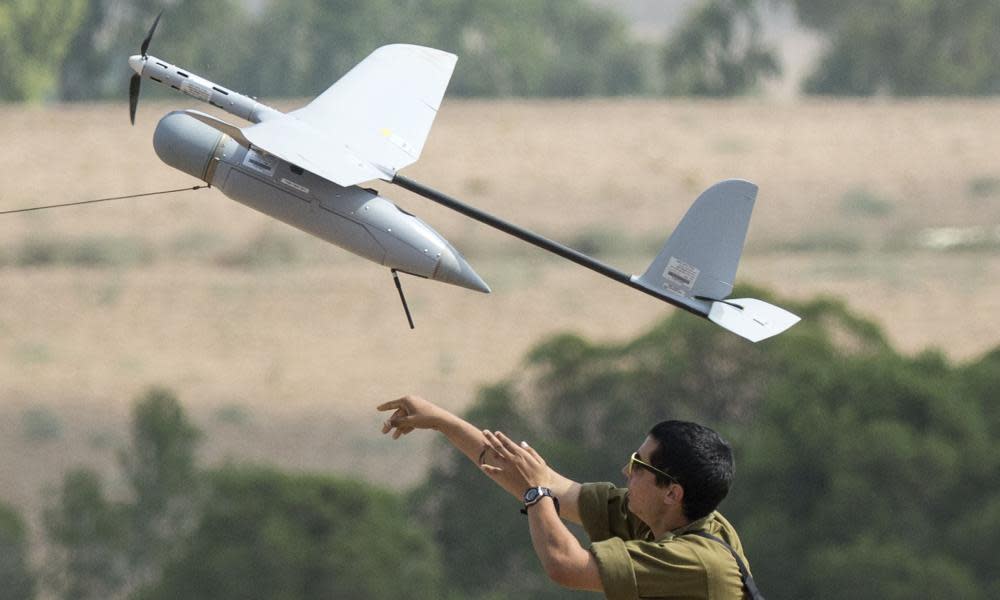Charges dropped over protest at Israeli military drones factory in UK

Criminal charges have been dropped against a group of protesters over a demonstration that blocked access to a factory making engines for Israeli military drones after witnesses from the companies involved pulled out of the case.
The five protesters were charged with “use [of] violence to compel activity or abstention from lawful activity” after blocking the entrances to a Staffordshire industrial estate which is the base for UAV Engines, a subsidiary of Israeli arms company Elbit, that makes the drones that fly over the Gaza Strip.
Huda Ammori, 23, one of the defendants, said they had hoped to challenge representatives of the company in court. However, the case against three of the five was dropped when UAV Engines’ manager decided not to testify.
Ammori and her remaining co-defendant had been due to stand trial on Friday, but were told this week it would no longer go ahead after a second key witness, the manager of a second company based at the site, Precision Metals and Plastics, said he could not appear, either.
Asked the reasons for dropping the case, a spokesman for the Crown Prosecution Service said: “There was no longer enough evidence to provide a realistic prospect of conviction.”
It is the fourth time within three years that prosecutions have been dropped against protesters who have blocked access to or trespassed on the UAV Engines factory. On each occasion, key witnesses from the company decided not to take the stand.
The five were arrested on 7 July, the eve of the third anniversary of Operation Protective Edge, Israel’s most recent major bombardment of Gaza, after they blocked the road and chained two gates to the industrial site in Shenstone, Staffordshire.
They were charged the following day and bailed until a plea hearing in August, which was adjourned until September. An initial case summary provided by the CPS made clear that the principal victim was David Cliff, the general manager of UAV Engines. In a statement to police, he described how he had been forced to send 10 workers home and felt intimidated by protesters who took his picture and asked questions about his job.
But before the plea hearing could take place, the prosecution dropped the charges against the three defendants who had protested at the gate principally serving UAV Engines. It subsequently emerged that Cliff had pulled out of the case. The protesters believe it was because he did not want to answer questions about the company’s work.
UAV Engines is a wholly owned subsidiary of Elbit Systems, which makes and markets a range of surveillance and attack drones. UAV Engines’ products include six lightweight engines it says are developed for surveillance drones.
Adie Mormech, one of the three whose cases were dropped when Cliff pulled out, spent time teaching in Gaza in 2012. “Drones were almost always in the sky, terrifying the lives of Palestinians in Gaza, as part of Israel’s brutal siege and decades-long military occupation of the Palestinian people,” he said.
The case continued against Ammori and Sam Nuttall, who had chained themselves together and to concrete blocks to blockade a second gate. Liam Roberts, the managing director of Precision Metals and Plastics, was to be the key witness. However, in October the CPS said the trial date would not be convenient for Roberts. They dropped the case after Ammori and Nutall’s lawyers objected to an application to change the date.
Ammori said it was clear there was a pattern exposed by the repeated collapse of cases involving protesters against UAV Engines after witnesses from the company refused to testify. A previous prosecution collapsed after the company refused to hand over evidence about its exports to Israel.
“This has happened four times over the past three years, yet not once has it ever gone to trial because Elbit is simply unwilling to give any evidence or to be put on the stand or questioned about their arms deals and the legality of their arms deals, because that is our defence,” she said.
“In the charge it actually says ‘abstention from lawful activity’ and that is one of the key points. Is what’s going on inside these factories lawful? In terms of international law it’s not lawful ... It’s just profiting from the mass murder of Palestinians, it’s just aiding Israel’s brutal military occupation, right here on British soil.”
Mike Schwarz of Bindmans solicitors, who represented the protesters, said: “The prosecution has collapsed, after four months, because the prosecution could not get to court two key witnesses. One is bound to speculate about why these witnesses were unwilling or unable to attend court.”
The Guardian has contacted UAV Engines for comment.

 Yahoo News
Yahoo News 
